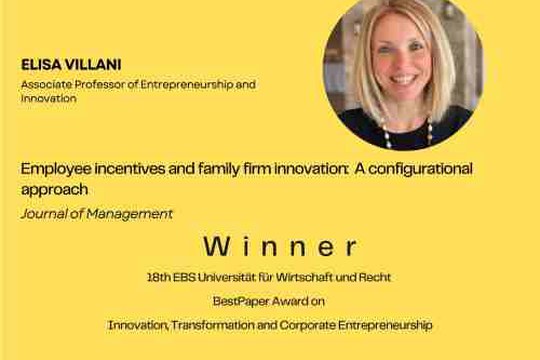EBS University annually honors outstanding scientific papers with high practical relevance on Innovation, Corporate Entrepreneurship, and Transformation.
By focusing on both cutting-edge research and practical implications, the awarded papers provide state-of-the-art insights for academics and practitioners equally. It is important that the papers submitted have been published in a scientific journal, and must not have been submitted to past EBS Best Paper Awards.
Submissions are assessed by the jury with regard to scientific excellence and practical relevance.
Three papers are selected among the many submitted and the authors are invited to present their work at EBS University in Oestrich-Winkel, Germany (November 14th, 2023).
The paper “Employee Incentives and Family Firm Innovation: A Configurational Approach”, co-authored by Elisa Villani (DISA), Christian Linder (SKEMA Business School - University of Côte d'Azur), Alfredo De Massis (Free University of Bozen-Bolzano IMD Business School Lancaster University Management School Zhejiang University), and Kimberly Eddleston (Northeastern University) was selected among the three papers invited for the presentation.
The Jury composed of EBS University’s scholars and managers/practitioners from Accenture, Boeing, and Siemens awarded the Best Paper to this paper.
The paper has important practical implications in providing insights into how incentives can be configured to achieve innovation. Looking at the context of family firms, the findings alert managers that incentive structures are a key mechanism to foster innovation, although which configuration of incentives is most effective depends on the firm’s culture. The authors find five configurations of incentive systems, which take into account both calculative and collaborative incentives, all conducive to innovation. The findings should therefore offer guidance on how incentives should be configured to align with a family firm’s culture in order to promote innovation.
Learn more about the paper.

